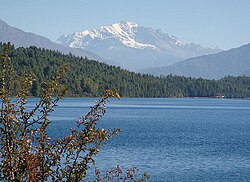Lake Rara
| Lake Rara राराताल | |
|---|---|
 Lake Rara, May 2005 | |
| Location | Mugu District |
| Coordinates | 29°31′33″N 82°05′25″E / 29.525721°N 82.090211°E |
| Type | Natural, oligotrophic |
| Primary inflows | Many small streams |
| Primary outflows | Nijar khola → Karnali River |
| Basin countries | Nepal |
| Max. length | 5.1 km (3.2 mi) |
| Max. width | 2.7 km (1.7 mi) |
| Surface area | 9.8 km2 (3.8 sq mi)[1] |
| Average depth | 100 m (330 ft) |
| Max. depth | 167 m (548 ft) |
| Water volume | 0.98 km3 (0.24 cu mi)[1] |
| Surface elevation | 2,990 m (9,810 ft) |
| Frozen | never |
| Islands | none |
| Settlements | none |
Rara Lake (Nepali: राराताल raratal) is the biggest natural lake of Nepal. It is in Rara Village Development Committee, Mugu District, Karnali Zone in the Mid-Western region.
The lake has a slightly oval shape and is entirely in the Rara National Park, about 300 km (190 mi) north-west of the capital, Kathmandu.
Features
[change | change source]Lake Rara is at an altitude of 2,990 metres (9,810 ft) above sea level covering an area of 9.8 km2 (3.8 sq mi).[2] The lake has a length of 5.1 kilometres (3.2 mi) and a width of 2.7 kilometres (1.7 mi) with a maximum depth of 167 metres (548 ft). It flows into the Karnali river via the Nijar river (Nijar Khola).[3]
The lake was classified as oligotrophic (an environment that offers little to sustain life) in limnological terms, meaning that is very slightly polluted.[2]
Climate
[change | change source]The climate of the Rara National Park, where the Lake Rara is, is a temperate climate with temperatures between 27 °C (81 °F) in summer and −4 °C (25 °F) in winter.[4]
Animal life
[change | change source]In the Lake Rara there are three endemic fish species (Schizothorax macrophthalmus, S. nepalensis and S. raraensis),[5] and one endemic frog (Paa rarica).[6]
Many waterfowl spend the winter months in Lake Rara; some of them are gadwall, mallard, northern shoveler, Eurasian teal, tufted duck, common goldeneye, goosander, Eurasian coot and solitary snipe.[2]
References
[change | change source]- ↑ 1.0 1.1 "Lake Rara". World Lake Database. International Lake Environment Committee Foundacion - ILEC. Retrieved 6 July 2016.[permanent dead link]
- ↑ 2.0 2.1 2.2 Khadka, Madhukar. "Study of Himalayan Lakes in Nepal" (PDF). Archived from the original (PDF) on 4 March 2016. Retrieved 20 October 2013.
{{cite journal}}: Cite journal requires|journal=(help) - ↑ "High Altitude Ramsar Sites of Nepal". The Initiation: 135–148. 2009. Retrieved 20 October 2013.
{{cite journal}}: Unknown parameter|authors=ignored (help) - ↑ "Rara National Park". HKH Conservation Portal. ICIMOD. Archived from the original on 4 March 2016. Retrieved 20 October 2013.
- ↑ Terashima, Akira (1984). "Three new species of the Cyprinid genus Schizothorax from Lake Rara, Northwestern Nepal" (PDF). Japanese Journal of Ichthyology. 31 (2): 122–135. Retrieved 20 October 2013.
- ↑ Ohler, A., Dutta, S., Shrestha, T. K. (2004). "Nanorana rarica". IUCN Red List of Threatened Species. Version 2010.4. International Union for Conservation of Nature.
{{cite web}}: CS1 maint: multiple names: authors list (link)
